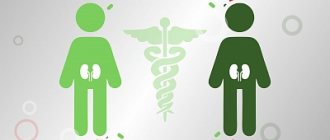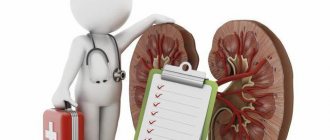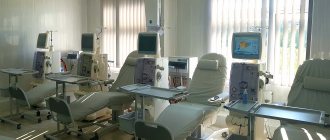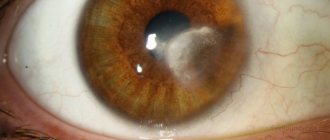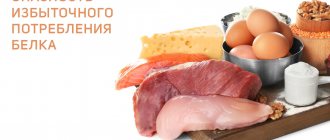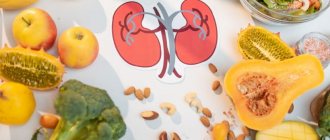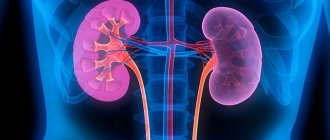General rules
For patients at the stage of end-stage renal failure, kidney transplantation is the optimal treatment method and the most rational way to improve the quality of life.
To speed up the rehabilitation of a patient after kidney transplantation, diet therapy plays an important role in the complex of treatment measures. Diet after kidney transplantation should be prescribed on an individual basis based on an assessment of the patient’s nutritional status and clinical and biochemical parameters, as well as his gender, age, body weight and level of physical activity.
The main goal of diet therapy in the early postoperative period is to improve/accelerate the healing of the postoperative wound surface, reduce the incidence of infectious complications, and when graft function decreases, correct water and electrolyte disturbances. At the next stage, the goal of diet therapy is to maintain/restore the disturbed nutritional status of the patient’s body, reduce the frequency and severity of side effects of immunosuppressive drugs, and, accordingly, complications from the cardiovascular system, the risk of developing steroid-induced diabetes and metabolic disorders.
After a kidney transplant operation, 5-6 hours later the patient is allowed to start giving fluids in small quantities (no more than 500 g on the first day). It is not recommended to increase the volume of fluid during this period due to the risk of developing edema .
On the second day after the operation, liquid, lightly salted mucous food is introduced into the diet in small portions 7-8 times a day (lean pureed soups, liquid oatmeal, jelly).
On the fourth day, the patient’s diet is expanded to include low-fat chicken broth, pureed vegetable soup, steam omelet, low-fat kefir, and weak tea.
After 7-8 days, the patient is allowed to eat lean chicken/turkey poultry, boiled chicken eggs, lean fish, and buckwheat porridge.
In the absence of adverse reactions and complications, after 3-4 weeks the patient is transferred to a permanent diet after a kidney transplant. Dietary nutrition should be as balanced as possible in all major food macro/micronutrients and liquids. The calorie content of the daily diet should be 35-40 kcal per 1 kg of body weight. When prescribing a therapeutic diet, it is important to take into account the function of the graft, which can vary widely from what is expected (from 15 to 100%).
It is also necessary to take into account that after transplantation, metabolic disorders may persist for quite a long time, the most significant of which are hyperparathyroidism (hyperfunction of the parathyroid glands) and hyperlipidemia (increased levels of lipids in the blood serum). In addition, constant use of immunosuppressive drugs to suppress the immune reaction of rejection of a transplanted kidney causes fluid retention in the body, promotes the deposition of fat (increase in body weight), as well as an increase in blood pressure .
And weight gain carries a high risk of developing cardiovascular complications. In this regard, it is necessary to control the amount of fat consumed and prevent hyperlipidemia and a sharp increase in body weight. In the total calorie content of the daily diet, fat should account for no more than 30%. To do this, fatty meats and meat products, smoked meats, animal/cooking fats, mayonnaise, margarine, and high-fat dairy products (cream, sour cream, whole milk, full-fat cottage cheese) are excluded from the diet.
The diet after a kidney transplant if the patient is overweight should have a reduced calorie content, which is calculated from the ratio of 25-30 kcal/kg per day. At the same time, it is necessary to exclude all energy-intensive foods from the diet, and in the presence of hyperlipidemia , the body’s energy supply from fats is limited by another 5-10%. It is important to control not only the quantitative intake of fats into the body, but the ratio of unsaturated fatty acids/saturated fatty acids, which should be greater than 1.
An extremely important element in dietary nutrition is adequate protein intake. At the same time, it is important to take into account the indicators and state of the body’s nitrogen metabolism. Preference should be given to sources of animal and plant origin with a balanced amino acid composition - dietary types of red meat and poultry, legumes, low-fat dairy products, soy, chicken protein, nuts. At the same time, the balance of protein component consumption should be shifted towards plant proteins. With reduced function of the transplanted kidney and the development of proteinuria (over 3 g per day), it is necessary to compensate for the protein by increasing the protein content in the diet to 110-120 g.
Particular attention is required to the quantitative content of carbohydrates and their ratio in the diet, since uncontrolled consumption of carbohydrates increases lipid metabolism disorders, and later after transplantation, contributes to the progression of complications from the cardiovascular system. Therefore, the calorie content of carbohydrates should be 45-50% of the total caloric content of the diet. At the same time, the consumption of easily absorbed carbohydrates (refined sugars, preserves, sweets, jams, confectionery) is limited, giving preference to products of plant origin containing complex carbohydrates (cereals, vegetables, fruits).
It should also be taken into account that immunosuppressive therapy in this category of patients for a long time causes an imbalance of micronutrients . To prevent the development of severe metabolic disorders, the diet should include foods containing many vitamins and microelements. It is especially important to control the content of calcium and phosphates in the diet. The body's daily need for calcium after transplantation is at least 1000-1500 mg. If its content is insufficient, it is recommended to take calcium supplements. To reduce the function of the parathyroid glands and to prevent nephrogenic osteopathy, it is recommended to take vitamin D or active metabolites of vitamin D3 .
It is extremely important for patients after kidney transplantation to correctly determine the need for inorganic phosphates, since it varies significantly between patients. A small category of patients have a tendency to increased phosphate excretion in the urine and the development of hypophosphatemia .
For this category of patients, it is necessary to include foods rich in phosphorus in the diet (dry yeast, pumpkin seeds, wheat bran, processed cheese, cottage cheese, beans, seafood, egg yolk, feta cheese, flounder, mackerel, nuts). creatinine clearance . When the rate decreases below 60 ml/min, it is necessary to limit the phosphorus content in the diet to reduce the risk of progression of renal failure. With a further decrease in liver function, the phosphorus content in the diet decreases, and calcium increases. Due to the high phosphorus content, all types of legumes are excluded from the diet. Calcium can be additionally administered in the form of medications.
If hypertension or edema , sodium intake in the diet is limited to 5-7 grams or less per day. It is recommended to avoid the consumption of salted butter, meat and fish, canned food, cheeses and regular wheat bread. Fluid consumption should be at the level of 1.5 l/day. It is not recommended to drink coffee, carbonated and alcoholic drinks.
Diet features
There are some nuances in the diet indicated after a kidney transplant:
Food should be prepared without the use of oil:
- steamed;
- baking;
- stewing;
- boiling;
- allowance.
Meals should be fractional. It is better to organize 5-7 approaches in small portions. This will allow you to gradually digest foods, not burden the digestive tract, and will ensure a constant flow of microelements into the bloodstream. You need to give up fast food and snacks. It is better to organize meals every 2 hours. It is necessary to reduce or completely eliminate flavor enhancers:
spices; salt; Sahara; seasoning
Eating foods high in potassium and magnesium has a positive effect on the body's condition.
These elements support cardiac activity and vascular tone, which is very important in the process of kidney engraftment. The most famous “storehouses” of potassium are dried apricots, prunes, raisins
Magnesium - bran, pumpkin and sunflower seeds, lentils and peas.
Foods rich in potassium and magnesium Consumption of excessive amounts of calcium and phosphorus, as well as their poor absorption, lead to the deposition of salts in the kidney and lead to the formation of stones. This is a very dangerous condition for a person who has undergone a transplant, especially if the damage to their own kidneys was caused by chronic kidney stones. Calcium, its salts and phosphates are of course necessary for the body, especially at the age of over 45-50 years, when the risk of developing osteoporosis is high, but it is recommended to use them in moderation and only after consultation and approval of the attending physician.
What can you eat
Recommended products include:
- Green vegetables (all types of cabbage, green beans, young peas, spinach, asparagus, celery, herbs: onions, dill, parsley, cilantro, etc.)
- Root vegetables: turnips, radishes, beets, Jerusalem artichokes, carrots.
- Pumpkin: pumpkins themselves, squash, zucchini and zucchini.
- Legumes: peas, beans, lentils, mung beans, chickpeas.
- Nightshades: tomatoes, potatoes, eggplants.
- Durum pasta, whole grain bread with the addition of bran and sesame.
- Cereals: corn, barley, pearl barley, buckwheat, millet, oatmeal.
- Lean meat (turkey, rabbit, chicken breasts, river fish, seafood).
- Fruits and dried fruits. They contain many useful elements and minerals, vitamins and microcompounds.
- Dairy products.
Acceptable foods, the consumption of which is recommended in small quantities no more than once a week, include:
- Diuretic foods: watermelon, melon, cucumbers, fennel.
- White bread is a rich product.
- Nuts (any kind, as they contain a lot of proteins and fats).
- Sweets (these are simple carbohydrates - the shortest path to rapid weight gain).
- Coffee. It is recommended to abandon instant coffee, giving preference to ground coffee beans. Large amounts of coffee have a bad effect on all body systems. It is also not recommended to drink strong tea and it is better to avoid adding sugar.
For lunch - full-fledged main courses: home-made steamed cutlets, meatballs, baked or boiled meat. Garnish: lentil or pea puree, green beans, pasta. For dinner - salads or side dishes (stew) with carrots, turnips, cabbage (any type), beets. You can add a little meat or fish, but it is better to refrain from carbohydrates. Main meals can be divided into 4 or 5 times. Between them, snacks should be organized, for which the following are suitable: dried fruits, fermented milk products or fruits.
What is prohibited
A categorical ban is imposed on salted and pickled foods, for example:
- salted tomatoes;
- pickles;
- canned, salted, dried fish;
- sausages (sausages, smoked and boiled sausages, bacon, sausages, etc.);
- margarine and butter;
- cheeses (especially highly salted and smoked products);
- carbonated and alcohol-containing drinks, including kvass.
All of the above products have an extremely negative effect on the condition of the kidneys and put an increased burden on the transplanted organ.
After a kidney transplant, it is extremely important that the transplanted organ takes root and functions normally for as long as possible. For this purpose, a number of measures are being carried out that are aimed at reducing the load on the urinary system, preventing various infectious infections, adjusting the functioning of the body’s immune system, etc.
An important aspect of the rehabilitation period is the patient’s diet. After all, exactly what he consumes as drinks and food will, after some time, be eliminated from the body in a processed form with the participation of the urinary system. Therefore, in our article we will understand in detail all the intricacies of the question of what a diet after a kidney transplant is.
Authorized Products
The diet after a kidney transplant involves the inclusion of soups cooked in vegetable broth in the diet. The choice of vegetables and cereals for making soups is unlimited, however, they should not be very sour or spicy. You can add garden herbs to ready-made dishes, and you can season soups with unsalted butter or sour cream.
For second courses, lean types of red meat and poultry and rabbit are recommended, which should be pre-boiled before cooking and the liquid should be drained. For fish, low-fat varieties of white fish are recommended, which can be boiled and baked with vegetables as a side dish. Almost all cereals can be included in the diet; yogurt, milk, omelet and soft-boiled eggs, low-fat cream, yogurt, low-fat cottage cheese and dishes made from it are allowed.
Sour cream is added only to ready-made dishes; all vegetables (except celery, radish, garlic, radishes, fresh onions). It is important to have a sufficient amount of vegetables in the diet, which can be boiled, stewed, baked, made into casseroles, salads, cutlets with the addition of cereals. It is useful to eat ripe, non-acidic fruits and berries, both fresh and processed (jelly, compotes, purees, preserves, jelly) or baked, as well as marshmallows, honey, marshmallows, caramel. Drinks allowed: rosehip infusion, freshly prepared juices, tea with lemon and sugar.
Table of permitted products
| Proteins, g | Fats, g | Carbohydrates, g | Calories, kcal | |
Vegetables and greens | ||||
| zucchini | 0,6 | 0,3 | 4,6 | 24 |
| cauliflower | 2,5 | 0,3 | 5,4 | 30 |
| potato | 2,0 | 0,4 | 18,1 | 80 |
| carrot | 1,3 | 0,1 | 6,9 | 32 |
| beet | 1,5 | 0,1 | 8,8 | 40 |
| tomatoes | 0,6 | 0,2 | 4,2 | 20 |
| pumpkin | 1,3 | 0,3 | 7,7 | 28 |
Fruits | ||||
| apricots | 0,9 | 0,1 | 10,8 | 41 |
| watermelon | 0,6 | 0,1 | 5,8 | 25 |
| bananas | 1,5 | 0,2 | 21,8 | 95 |
| melon | 0,6 | 0,3 | 7,4 | 33 |
| figs | 0,7 | 0,2 | 13,7 | 49 |
| nectarine | 0,9 | 0,2 | 11,8 | 48 |
| peaches | 0,9 | 0,1 | 11,3 | 46 |
| apples | 0,4 | 0,4 | 9,8 | 47 |
Berries | ||||
| strawberry | 0,8 | 0,4 | 7,5 | 41 |
Nuts and dried fruits | ||||
| raisin | 2,9 | 0,6 | 66,0 | 264 |
| dried apricots | 5,2 | 0,3 | 51,0 | 215 |
| dried apricots | 5,0 | 0,4 | 50,6 | 213 |
| dates | 2,5 | 0,5 | 69,2 | 274 |
Cereals and porridges | ||||
| buckwheat (kernel) | 12,6 | 3,3 | 62,1 | 313 |
| semolina | 10,3 | 1,0 | 73,3 | 328 |
| cereals | 11,9 | 7,2 | 69,3 | 366 |
| corn grits | 8,3 | 1,2 | 75,0 | 337 |
| pearl barley | 9,3 | 1,1 | 73,7 | 320 |
| millet cereal | 11,5 | 3,3 | 69,3 | 348 |
| boiled brown rice | 2,6 | 0,9 | 22,8 | 110 |
Confectionery | ||||
| jelly | 2,7 | 0,0 | 17,9 | 79 |
| milk candies | 2,7 | 4,3 | 82,3 | 364 |
| fondant candies | 2,2 | 4,6 | 83,6 | 369 |
| paste | 0,5 | 0,0 | 80,8 | 310 |
Raw materials and seasonings | ||||
| cinnamon | 3,9 | 3,2 | 79,8 | 261 |
| honey | 0,8 | 0,0 | 81,5 | 329 |
| dried parsley | 22,4 | 4,4 | 21,2 | 276 |
| milk sauce | 2,0 | 7,1 | 5,2 | 84 |
| sour cream sauce | 1,9 | 5,7 | 5,2 | 78 |
| tomato sauce | 1,7 | 7,8 | 4,5 | 80 |
| caraway | 19,8 | 14,6 | 11,9 | 333 |
| dried dill | 2,5 | 0,5 | 6,3 | 40 |
Dairy | ||||
| milk | 3,2 | 3,6 | 4,8 | 64 |
| kefir | 3,4 | 2,0 | 4,7 | 51 |
| curdled milk | 2,9 | 2,5 | 4,1 | 53 |
| acidophilus | 2,8 | 3,2 | 3,8 | 57 |
| yogurt | 4,3 | 2,0 | 6,2 | 60 |
Cheeses and cottage cheese | ||||
| cottage cheese | 17,2 | 5,0 | 1,8 | 121 |
Meat products | ||||
| boiled beef | 25,8 | 16,8 | 0,0 | 254 |
| boiled beef tongue | 23,9 | 15,0 | 0,0 | 231 |
| boiled veal | 30,7 | 0,9 | 0,0 | 131 |
| rabbit | 21,0 | 8,0 | 0,0 | 156 |
Bird | ||||
| boiled chicken | 25,2 | 7,4 | 0,0 | 170 |
| turkey | 19,2 | 0,7 | 0,0 | 84 |
Eggs | ||||
| chicken eggs | 12,7 | 10,9 | 0,7 | 157 |
Fish and seafood | ||||
| boiled fish | 17,3 | 5,0 | 0,0 | 116 |
Oils and fats | ||||
| peasant unsalted butter | 1,0 | 72,5 | 1,4 | 662 |
| corn oil | 0,0 | 99,9 | 0,0 | 899 |
| olive oil | 0,0 | 99,8 | 0,0 | 898 |
| sunflower oil | 0,0 | 99,9 | 0,0 | 899 |
| ghee | 0,2 | 99,0 | 0,0 | 892 |
Non-alcoholic drinks | ||||
| mineral water | 0,0 | 0,0 | 0,0 | — |
| black tea | 20,0 | 5,1 | 6,9 | 152 |
Juices and compotes | ||||
| apricot juice | 0,9 | 0,1 | 9,0 | 38 |
| carrot juice | 1,1 | 0,1 | 6,4 | 28 |
| pumpkin juice | 0,0 | 0,0 | 9,0 | 38 |
| rose hip juice | 0,1 | 0,0 | 17,6 | 70 |
| * data is per 100 g of product | ||||
Diet features
The diet indicated after a kidney transplant has some nuances:
- Food should be prepared without using oil: steamed;
- baking;
- stewing;
- boiling;
- allowance.
- spices;
Eating foods high in potassium and magnesium has a positive effect on the body's condition.
These elements support cardiac activity and vascular tone, which is very important in the process of kidney engraftment. The most famous “storehouses” of potassium are dried apricots, prunes, raisins
Magnesium - bran, pumpkin and sunflower seeds, lentils and peas.
Foods rich in potassium and magnesium
What can you eat
Recommended products include:
- Green vegetables (all types of cabbage, green beans, young peas, spinach, asparagus, celery, herbs: onions, dill, parsley, cilantro, etc.)
- Root vegetables: turnips, radishes, beets, Jerusalem artichokes, carrots.
- Pumpkin: pumpkins themselves, squash, zucchini and zucchini.
- Legumes: peas, beans, lentils, mung beans, chickpeas.
- Nightshades: tomatoes, potatoes, eggplants.
- Durum pasta, whole grain bread with the addition of bran and sesame.
- Cereals: corn, barley, pearl barley, buckwheat, millet, oatmeal.
- Lean meat (turkey, rabbit, chicken breasts, river fish, seafood).
- Fruits and dried fruits. They contain many useful elements and minerals, vitamins and microcompounds.
- Dairy products.
Acceptable foods, the consumption of which is recommended in small quantities no more than once a week, include:
- Diuretic foods: watermelon, melon, cucumbers, fennel.
- White bread is a rich product.
- Nuts (any kind, as they contain a lot of proteins and fats).
- Sweets (these are simple carbohydrates - the shortest path to rapid weight gain).
- Coffee. It is recommended to abandon instant coffee, giving preference to ground coffee beans. Large amounts of coffee have a bad effect on all body systems. It is also not recommended to drink strong tea and it is better to avoid adding sugar.
Patients should reduce the amount of soups and rich broths. It is better to eat semi-liquid foods, for example, cream soup or main courses. For breakfast, it is good to eat slow carbohydrates: whole grain bread, cereals with water, dairy products.
For lunch - full-fledged main courses: home-made steamed cutlets, meatballs, baked or boiled meat. Garnish: lentil or pea puree, green beans, pasta. For dinner - salads or side dishes (stew) with carrots, turnips, cabbage (any type), beets. You can add a little meat or fish, but it is better to refrain from carbohydrates. Main meals can be divided into 4 or 5 times. Between them, snacks should be organized, for which the following are suitable: dried fruits, fermented milk products or fruits.
What is prohibited
A categorical ban is imposed on salted and pickled foods, for example:
- salted tomatoes;
- pickles;
- canned, salted, dried fish;
- sausages (sausages, smoked and boiled sausages, bacon, sausages, etc.);
- margarine and butter;
- cheeses (especially highly salted and smoked products);
- carbonated and alcohol-containing drinks, including kvass.
All of the above products have an extremely negative effect on the condition of the kidneys and put an increased burden on the transplanted organ.
Source: gidmed.com
Fully or partially limited products
The diet after a kidney transplant involves the exclusion of any concentrated broths containing meat/fish/mushrooms, or soups containing legumes and vegetables. All fatty types of red meat and waterfowl (pork, fatty lamb, duck, goose), sausages, smoked meats, fried foods, canned food, baked/stewed meat without prior boiling are excluded.
It is not allowed to consume animal refractory fats, fatty dairy products (cream, sour cream), milk soups and porridges with milk, salted fish, canned fish, fish caviar, spinach, garlic, radishes, onions, sorrel, radishes, mushrooms, pickled/pickled vegetables , regular bread, flour and confectionery products (cakes, pancakes, cookies, pies, pancakes), cheeses.
It is forbidden to use hot sauces/seasonings - horseradish, mayonnaise, pepper, mustard. Limit the consumption of salt and any salty foods. As for drinks, it is prohibited to consume cocoa, strong coffee, Pepsi, cola, Sprite, energy drinks, sodium mineral waters, and alcohol.
Table of prohibited products
| Proteins, g | Fats, g | Carbohydrates, g | Calories, kcal | |
Vegetables and greens | ||||
| sauerkraut | 1,8 | 0,1 | 4,4 | 19 |
| green onion | 1,3 | 0,0 | 4,6 | 19 |
| bulb onions | 1,4 | 0,0 | 10,4 | 41 |
| canned cucumbers | 2,8 | 0,0 | 1,3 | 16 |
| pickles | 0,8 | 0,1 | 1,7 | 11 |
| radish | 1,2 | 0,1 | 3,4 | 19 |
| white radish | 1,4 | 0,0 | 4,1 | 21 |
| turnip | 1,5 | 0,1 | 6,2 | 30 |
| celery | 0,9 | 0,1 | 2,1 | 12 |
| canned tomatoes | 1,1 | 0,1 | 3,5 | 20 |
| horseradish | 3,2 | 0,4 | 10,5 | 56 |
| garlic | 6,5 | 0,5 | 29,9 | 143 |
| spinach | 2,9 | 0,3 | 2,0 | 22 |
| sorrel | 1,5 | 0,3 | 2,9 | 19 |
Mushrooms | ||||
| mushrooms | 3,5 | 2,0 | 2,5 | 30 |
| marinated mushrooms | 2,2 | 0,4 | 0,0 | 20 |
Snacks | ||||
| potato chips | 5,5 | 30,0 | 53,0 | 520 |
Flour and pasta | ||||
| vareniki | 7,6 | 2,3 | 18,7 | 155 |
| pancakes | 6,3 | 7,3 | 51,4 | 294 |
| dumplings | 11,9 | 12,4 | 29,0 | 275 |
Bakery products | ||||
| buns | 7,9 | 9,4 | 55,5 | 339 |
Confectionery | ||||
| jam | 0,3 | 0,2 | 63,0 | 263 |
| jam | 0,3 | 0,1 | 56,0 | 238 |
| cookie | 7,5 | 11,8 | 74,9 | 417 |
Ice cream | ||||
| ice cream | 3,7 | 6,9 | 22,1 | 189 |
Cakes | ||||
| cake | 4,4 | 23,4 | 45,2 | 407 |
Chocolate | ||||
| chocolate | 5,4 | 35,3 | 56,5 | 544 |
Raw materials and seasonings | ||||
| mustard | 5,7 | 6,4 | 22,0 | 162 |
| brewer's yeast | 12,7 | 2,7 | 0,0 | 75 |
| ginger | 1,8 | 0,8 | 15,8 | 80 |
| ketchup | 1,8 | 1,0 | 22,2 | 93 |
| mayonnaise | 2,4 | 67,0 | 3,9 | 627 |
| ground black pepper | 10,4 | 3,3 | 38,7 | 251 |
| sugar | 0,0 | 0,0 | 99,7 | 398 |
| salt | 0,0 | 0,0 | 0,0 | — |
Dairy | ||||
| cream 35% (fat) | 2,5 | 35,0 | 3,0 | 337 |
| sour cream 18% | 2,5 | 18,0 | 3,6 | 184 |
Cheeses and cottage cheese | ||||
| cottage cheese 18% (fat) | 14,0 | 18,0 | 2,8 | 232 |
Meat products | ||||
| fatty pork | 11,4 | 49,3 | 0,0 | 489 |
| salo | 2,4 | 89,0 | 0,0 | 797 |
| bacon | 23,0 | 45,0 | 0,0 | 500 |
Sausages | ||||
| smoked sausage | 28,2 | 27,5 | 0,0 | 360 |
Bird | ||||
| smoked chicken | 27,5 | 8,2 | 0,0 | 184 |
| duck | 16,5 | 61,2 | 0,0 | 346 |
| smoked duck | 19,0 | 28,4 | 0,0 | 337 |
| goose | 16,1 | 33,3 | 0,0 | 364 |
Fish and seafood | ||||
| dried fish | 17,5 | 4,6 | 0,0 | 139 |
| smoked fish | 26,8 | 9,9 | 0,0 | 196 |
| salted fish | 19,2 | 2,0 | 0,0 | 190 |
| black caviar | 28,0 | 9,7 | 0,0 | 203 |
| salmon caviar granular | 32,0 | 15,0 | 0,0 | 263 |
| canned fish | 17,5 | 2,0 | 0,0 | 88 |
| semi-finished fish products | 12,5 | 6,7 | 14,7 | 209 |
| salmon | 21,6 | 6,0 | — | 140 |
| tuna | 23,0 | 1,0 | — | 101 |
Oils and fats | ||||
| animal fat | 0,0 | 99,7 | 0,0 | 897 |
| cooking fat | 0,0 | 99,7 | 0,0 | 897 |
Alcoholic drinks | ||||
| vodka | 0,0 | 0,0 | 0,1 | 235 |
| beer | 0,3 | 0,0 | 4,6 | 42 |
| * data is per 100 g of product | ||||
Diet features
The diet indicated after a kidney transplant has some nuances:
- Food should be prepared without using oil: steamed;
- baking;
- stewing;
- boiling;
- allowance.
- spices;
Eating foods high in potassium and magnesium has a positive effect on the body's condition.
These elements support cardiac activity and vascular tone, which is very important in the process of kidney engraftment. The most famous “storehouses” of potassium are dried apricots, prunes, raisins
Magnesium - bran, pumpkin and sunflower seeds, lentils and peas.
Foods rich in potassium and magnesium
What can you eat
Recommended products include:
- Green vegetables (all types of cabbage, green beans, young peas, spinach, asparagus, celery, herbs: onions, dill, parsley, cilantro, etc.)
- Root vegetables: turnips, radishes, beets, Jerusalem artichokes, carrots.
- Pumpkin: pumpkins themselves, squash, zucchini and zucchini.
- Legumes: peas, beans, lentils, mung beans, chickpeas.
- Nightshades: tomatoes, potatoes, eggplants.
- Durum pasta, whole grain bread with the addition of bran and sesame.
- Cereals: corn, barley, pearl barley, buckwheat, millet, oatmeal.
- Lean meat (turkey, rabbit, chicken breasts, river fish, seafood).
- Fruits and dried fruits. They contain many useful elements and minerals, vitamins and microcompounds.
- Dairy products.
Acceptable foods, the consumption of which is recommended in small quantities no more than once a week, include:
- Diuretic foods: watermelon, melon, cucumbers, fennel.
- White bread is a rich product.
- Nuts (any kind, as they contain a lot of proteins and fats).
- Sweets (these are simple carbohydrates - the shortest path to rapid weight gain).
- Coffee. It is recommended to abandon instant coffee, giving preference to ground coffee beans. Large amounts of coffee have a bad effect on all body systems. It is also not recommended to drink strong tea and it is better to avoid adding sugar.
For lunch - full-fledged main courses: home-made steamed cutlets, meatballs, baked or boiled meat. Garnish: lentil or pea puree, green beans, pasta. For dinner - salads or side dishes (stew) with carrots, turnips, cabbage (any type), beets. You can add a little meat or fish, but it is better to refrain from carbohydrates. Main meals can be divided into 4 or 5 times. Between them, snacks should be organized, for which the following are suitable: dried fruits, fermented milk products or fruits.
What is prohibited
A categorical ban is imposed on salted and pickled foods, for example:
- salted tomatoes;
- pickles;
- canned, salted, dried fish;
- sausages (sausages, smoked and boiled sausages, bacon, sausages, etc.);
- margarine and butter;
- cheeses (especially highly salted and smoked products);
- carbonated and alcohol-containing drinks, including kvass.
All of the above products have an extremely negative effect on the condition of the kidneys and put an increased burden on the transplanted organ.
Diet menu after kidney transplant (Diet)
The diet of patients in the long-term postoperative period (after a month) is not too different from the usual diet, with the exception of fatty fried, processed and salty foods. Since the diet contains meat, cereals, cottage cheese and various vegetables, the diet can be varied, and the limitation of salt and hot seasonings can be compensated for with homemade herbs, dried herbs, and homemade sauces. An approximate menu for three days is given below.
First day
| Breakfast |
|
| Lunch |
|
| Dinner |
|
| Afternoon snack |
|
| Dinner |
|
Second day
| Breakfast |
|
| Lunch |
|
| Dinner |
|
| Afternoon snack |
|
| Dinner |
|
The third day
| Breakfast |
|
| Lunch |
|
| Dinner |
|
| Afternoon snack |
|
| Dinner |
|
Reviews and results
According to reviews, dietary nutrition after a kidney transplant for patients shortens the rehabilitation period and normalizes both kidney function and the general condition of the body. Some patients find it difficult to get used to limiting salt and salty foods, considering food tasteless, but they believe that they can gradually get used to it. Strict adherence to the diet after a few days reduces swelling, normalizes blood pressure, and improves general condition.
- “... When I underwent a kidney transplant, I was prescribed strong immunosuppressants and a therapeutic diet. In general, the diet is doable, the most unpleasant thing is the unsalted food, which at first simply “didn’t fit” into your mouth. But the understanding that you need to get used to this (if you want to live) gradually developed new taste preferences. Now I almost effortlessly eat all cereals, any soups, meat with virtually no salt. Garden herbs, dried overseas herbs, lemon juice, and homemade sauces are very helpful. I bake myself unsalted grain bread and crispbread, make homemade pastries with cottage cheese, various vegetable fillings and jam. A year later, I was allowed to slightly increase the amount of salt in my diet, and in general everything with my diet returned to normal. I periodically undergo tests and am observed at the clinic.”
Food restrictions
First of all, you need to pay attention to plant foods
Let's figure out what you can eat after a kidney transplant
First of all, you need to pay attention to plant foods
It is rich in fiber, which has a very positive effect on intestinal function (which is important in the period after surgery). Products with minimal heat treatment (preferably steamed) and raw vegetables and fruits contain essential microelements, vitamins and other beneficial compounds, which have a good effect on both the kidneys and the entire body as a whole.
As part of the diet, in the postoperative period, it is necessary to limit the consumption of animal fats, replacing them with vegetable oils in a minimum amount, and avoid frying foods
Products with minimal heat treatment (preferably steamed) and raw vegetables and fruits contain essential microelements, vitamins and other beneficial compounds, and have a good effect on both the kidneys and the entire body as a whole. As part of the diet, in the postoperative period, it is necessary to limit the consumption of animal fats, replacing them with vegetable oils in a minimum amount, and avoid frying foods.
| Not recommended for use | Can be consumed |
| · Pork; · Mutton; · Duck; · Oily fish. | · Chicken breast; · Rabbit meat; · Lean veal and beef; · Turkey; · Seafood; · River fish. |
The following fermented milk products are allowed: cottage cheese and unsalted curd cheeses, ricotta, matsoni.
